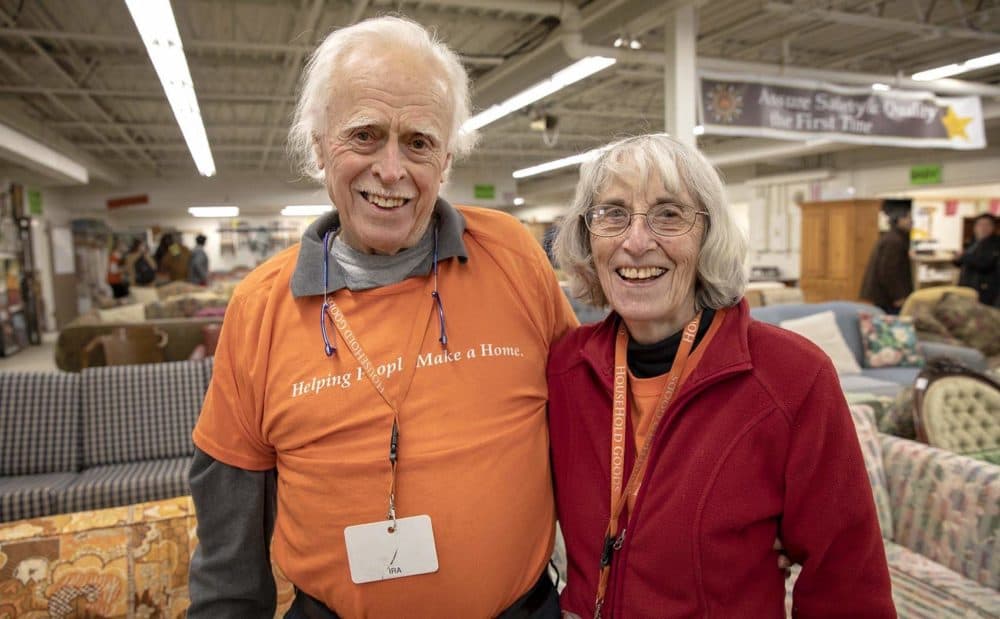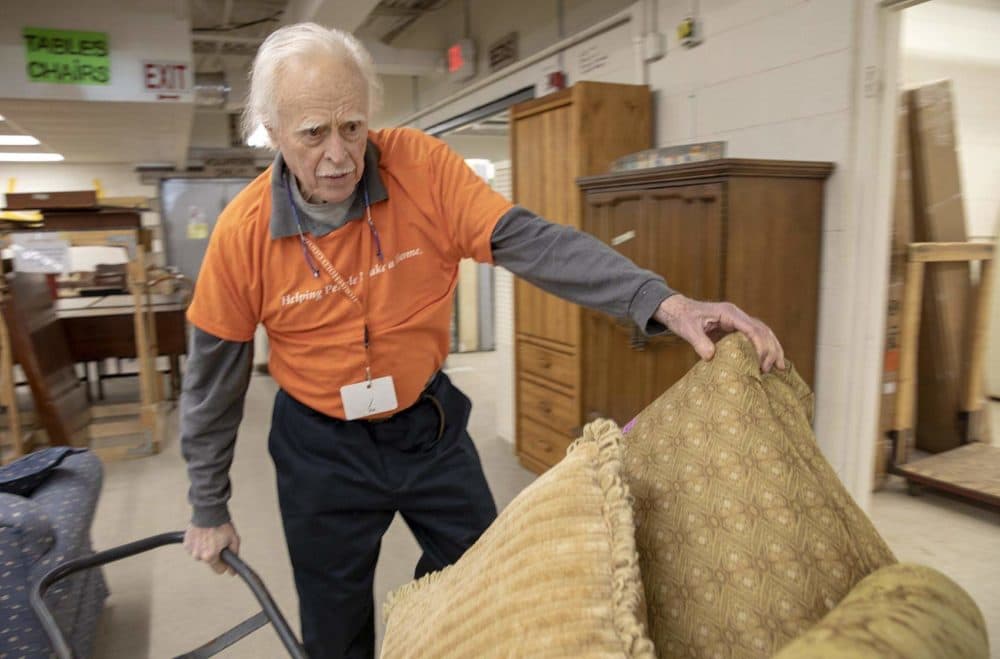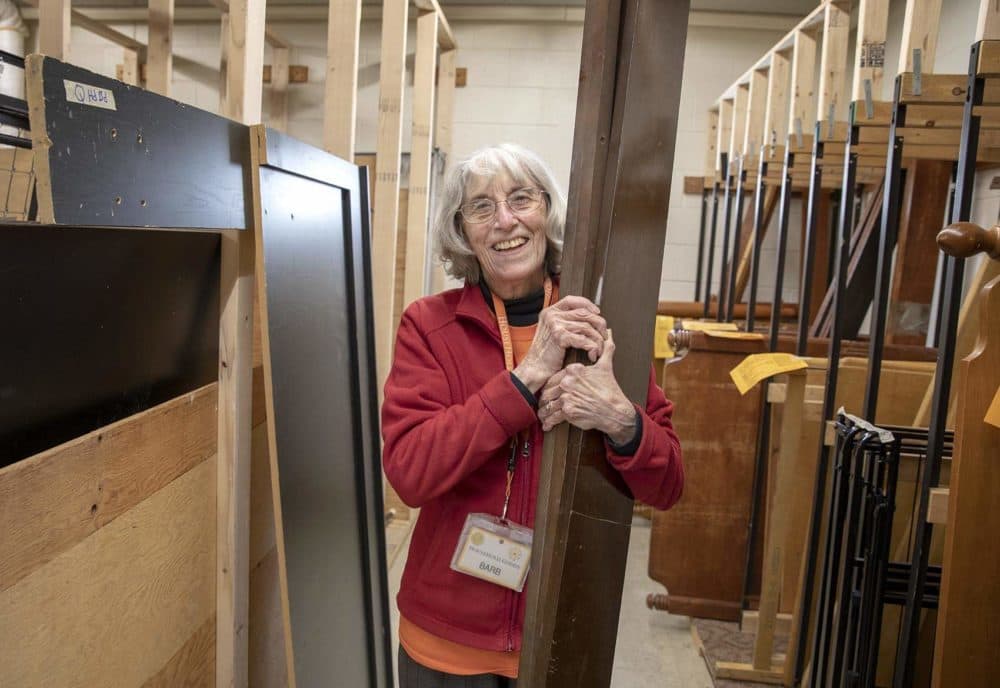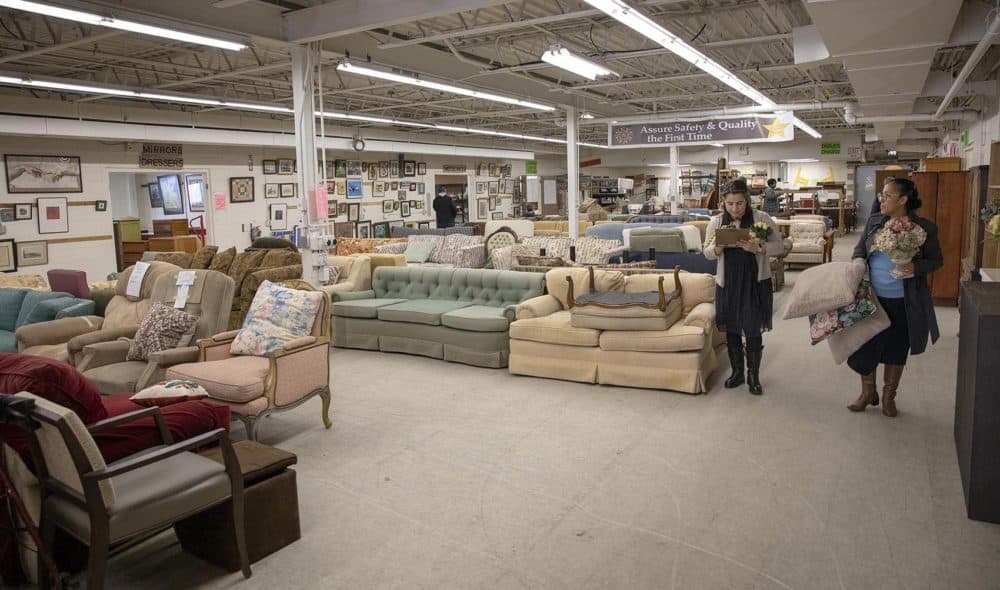Advertisement
Change Agents
This Elderly Couple Has Given Away 'Household Goods' — And Hope — For Decades
Resume
There's a furniture superstore of sorts in a leafy suburb west of Boston. It has just about everything you need to make a house a home.
The store is for a select clientele: people who can't afford furnishings on their own. Among them are families coming out of homelessness, women who've fled domestic violence, refugees and veterans.
The place is called Household Goods. It's tucked down a winding driveway in Acton, in a sea of tall pine trees.
A few days a week, dozens of cars, vans and box trucks pull up to the loading dock. People are coming to donate household items they don't need anymore. A fleet of volunteers in orange t-shirts directs them and sorts out the deliveries.
"Box spring!" a man yells from inside a trailer as he pushes it out. "Got it!" another volunteer says, as she adds to the donation tally on her clipboard.
Workers cart the goods into the sprawling 20,000-square-foot industrial building. Soon, people will be here to shop. But they won't pay a penny.
Inside the building are the two people responsible for this entire operation: a couple with white hair and an unassuming presence, Barbara and Ira Smith. Barbara describes herself and her husband as "the original founders of this magnificent program," adding, "Lucky us." Ira says he is "very happily at work."
The Smiths haven't collected a paycheck in three decades doing this.

Every year, the organization the Smiths founded helps about 2,400 families or individuals in need furnish their homes.
"One thing that's really been critical to our success is the fact we have insisted from day one that the clients be treated with respect," Barbara Smith says. "There is a wonderful spirit in this building ... of acceptance and joy."
The Smiths have a quiet joy about them. They're 88 years old — give or take.
"Eighty seven and three quarters," Barbara says. "Eighty eight and a half," says Ira.
Asked how many days a week they work, Barbara responds that they try for six half-days.
"And the half days are getting shorter," she adds.
We sit with the Smiths on one of the many donated couches in the main showroom of Household Goods, right by rows of easy chairs and dining sets. The side rooms are full of linens, dishes, lamps, bed frames and mattresses. There's framed artwork hanging all over one long wall.
This all started unintentionally in 1990. The Smiths had raised six kids, and Ira had a good job in the missile program at Raytheon.
Barbara heard through her church that a woman and daughter who had fled the violence in El Salvador had moved to Acton. They couldn't afford furniture. So Smith organized a donation drive, and the goods started flowing in. Even after the immigrant family had its furnishings, the donations kept coming.
"I would come home from the grocery store, and there in our carport would be a box spring and mattress or a stack of boxes and bags of donated things," Barbara Smith recalls. "People began to figure, 'I don't need this. Let's give it to Barb and Ira.' "
Their property got so overrun, their kids thought they were losing it. Ira spent weekends hauling donations.
"At that time we didn't have a truck," he recalls. "Then we finally bought a truck — old beat up truck. It was orange with black rust marks on it. Everybody in town saw us coming."
After almost a decade operating that way, the Smiths started storing donated items in several spaces around town people offered to them: the basement of another church, a garage, a carriage house and two barns. They'd have to take clients to one location for mattresses and another for saucepans.
One day they noticed the temperature inside one of the barns was 8 degrees below zero. They knew they had to invest in a "decent place," Barbara Smith says.
They found the huge industrial building. It had heat, air conditioning and real floors! But the Smiths barely had a bank account.
"One of the volunteers said, 'Sign the lease,' " Barbara recounts.
They took a leap of faith.
"We had no idea that we could raise that kind of money," she says.

That volunteer and the board ended up raising $75,000 to cover a year's worth of rent and other expenses. Household Goods eventually bought the building. Operating expenses these days are nearly a half-million dollars a year, while the organization gives away about $2 million worth of furnishings.
The Smiths seem in awe of how their leap of faith worked out. Ira came to realize he loved this kind of work. Nothing against defense work, he says.
"It was just the kind of job I had didn't have much meaning," he explains.
This new job — helping people — became kind of a lifesaver for him.
"I was depressed, and this finally brought me out of that," Ira reflects. "I thought, 'Gee, I got a job when I'm 60. It goes on for 30 years at no pay ... But it's the greatest thing that's happened that ... it's a happy place to be and I'm very happy."
That "happy place" is full of the sounds of volunteers sorting donated goods, including cookie cutters and coffee mugs. Volunteers in the "testing room" check things out and make minor repairs.

At 1 o'clock, clients start to arrive; they're sent here by social service agencies. About a dozen clients are due in today — among them, a mom and her three teenage kids, and a veteran named Boris. He's moving from a homeless shelter to an apartment of his own in Jamaica Plain. A volunteer guides him through the center.
"Did you need some sort of small table or counter?" the volunteer asks as the pair walks by dining tables and hutches. "A small cart or something," Boris responds. "A little, like, microwave cart that I could use."
The Smiths point out it takes thousands of people for this organization to work — people who donate items, 800 volunteers who give of their time each year, the handful of paid employees, and the advocates who refer clients and help them coordinate their furniture pick-ups.
The Smiths say the grateful clients keep them going. They receive many hugs.
"Some clients on their way out stop and write a little message in a notebook up front," Barbara Smith says. "And one person, a man, signed in some time in the summer. And he said, 'You think you give away furniture and dishes and pictures, but you give away a great deal more than that. You give people hope."
Editor's Note: This story is part of an ongoing series called "Change Agents," where we highlight people who are changing lives with little fanfare.
This segment aired on April 10, 2019.

